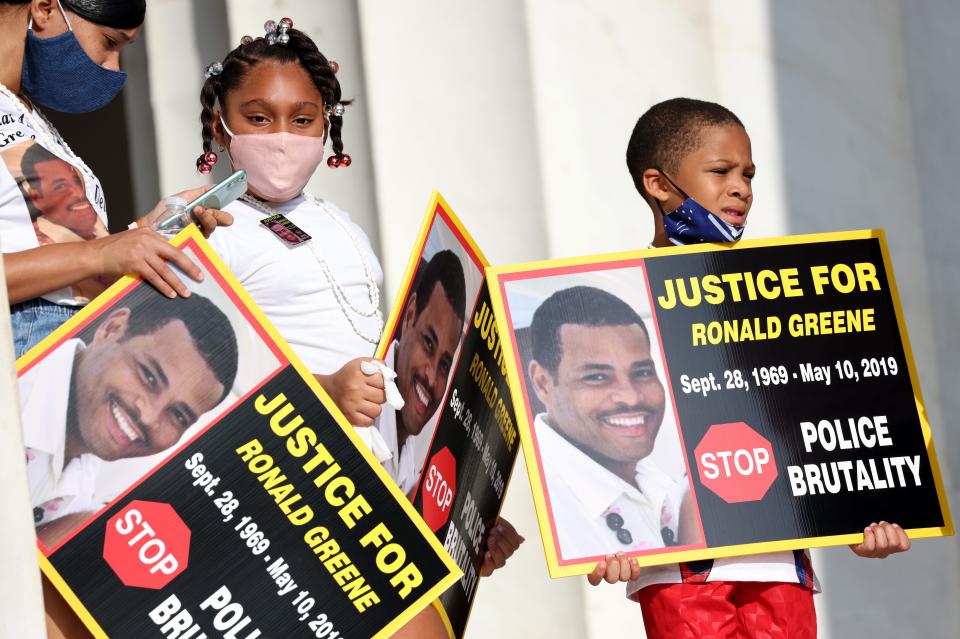How long do you have to report police brutality? Why one year is hardly enough.
In May 2019, Ronald Greene was beaten to death by Louisiana state troopers. Patrol leadership initially waged an aggressive cover-up campaign, claiming Greene had died in a car crash and concealing body-worn camera footage of the incident. It would be two years before his family would see the footage and learn the full, horrific circumstances of his death.
In Louisiana, where victims of police violence have only one year to file a case in court, this prolonged cover-up would present a prohibitive delay, destroying any possibility of holding the officers or the department accountable.
The deadline, also known as the “statute of limitations,” to file a federal civil rights lawsuit varies from state to state. The majority of states allow civil rights plaintiffs several years to file a lawsuit after their rights have been violated. However, people who suffer civil rights violations in Kentucky, Louisiana and Tennessee only have one year to file their case.
Opinions in your inbox: Get exclusive access to our columnists and the best of our columns
One-year deadlines to file lawsuits block search for justice
Fortunately, Greene’s case was an exception, because the initial official story did not add up and his family was able to find an attorney to file a lawsuit before the deadline, despite the incomplete picture created by the state’s misdirections.
Last week, five Louisiana law enforcement officials pleaded not guilty to criminal charges connected to Greene's death and the cover-up. The charges include negligent homicide and obstruction of justice.

Most victims of police misconduct do not fare as well. One-year deadlines block thousands of people who are abused by the police from pursuing justice in their states. This deadline creates an insurmountable barrier for many people harmed by police violence.
As we saw in Greene's case, police can wield their immense power to make the already burdensome task of preparing a civil rights lawsuit even more challenging. In states with a one-year statute of limitations, police deploy tactics to run out the clock knowing full well that a delay will keep victims and their families from being able to file a case against them.
Co-existing truths: Louisville officers were heroes in shooting, but department still has 'troubling' problems
Trust critical to public safety: Yet another fatal police shooting caught on camera. A month later, where's the video?
They can and do make it difficult for people to acquire the initial evidence they need to build a case by withholding information or supplying false information.
They can also delay proceedings by filing charges against the victim of abuse, which precludes many people from pursuing civil rights cases.
Trauma, injuries, shortage of attorneys also could delay civil lawsuits
In addition to these types of active police interference, victims grappling with trauma or recovering from physical injuries are often unable to collect information and undertake the effort of finding an attorney within a year. Others fear retaliation and might be unable to pursue a civil rights case until they have relocated to a safe place where police cannot inflict further harm.
Another common issue we see is the time it takes to find an attorney, a process that can take more than a year, especially in areas like the rural South, where there is a shortage of attorneys.
'Right to an attorney' only goes so far: War on crime leaves injustice in its wake
Reforming incarceration: My father, Muhammad Ali, didn't belong in prison. Nonviolent offenders don't, either.
One year is simply not long enough for most victims of police violence to file a case. States with a one-year statute of limitations know this and persist in upholding them as a way to suppress valid cases against law enforcement.
Opinion alerts: Get columns from your favorite columnists + expert analysis on top issues, delivered straight to your device through the USA TODAY app. Don't have the app? Download it for free from your app store.
Federal legislation can fix this injustice. In fact, Congress previously enacted a law that creates a national four-year statute of limitations for violations of most federal rights. Unfortunately, this legislation did not cover civil rights claims, but there is nothing stopping elected officials from extending the same protections to civil rights victims by creating a similar standardized deadline for their claims.
This change should not be controversial. It does not create new rights for victims, make it easier to prove a case or remove any substantive protections from police officers. It simply ensures that where you live doesn’t determine whether you get the opportunity to file a lawsuit when your constitutional rights are violated.

Lawsuits alone cannot end police violence, but they can help deter future officer misconduct and empower victims by giving them an opportunity to hold harmful actors accountable. They can also create the sustained pressure to expose the horrors inflicted by law enforcement, as the lawsuit did in Ronald Greene’s case.
Standardizing the statute of limitations for police misconduct cases will simply give civil rights laws a chance to work. While Americans deserve comprehensive reform from their elected officials, a law providing victims of police misconduct with the same chance to have a day in court as other people suing under federal law is the least we should do.
Lauren Bonds is the executive director of the National Police Accountability Project.
You can read diverse opinions from our Board of Contributors and other writers on the Opinion front page, on Twitter @usatodayopinion and in our daily Opinion newsletter. To respond to a column, submit a comment to letters@usatoday.com.
This article originally appeared on USA TODAY: How statutes of limitations silence victims of police brutality

